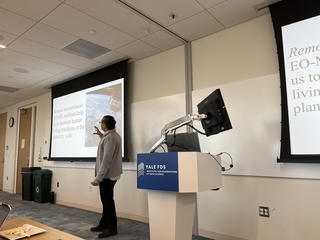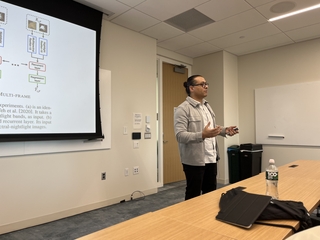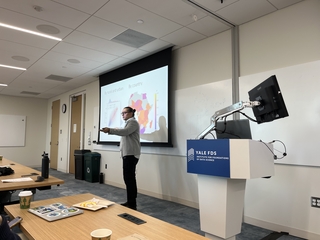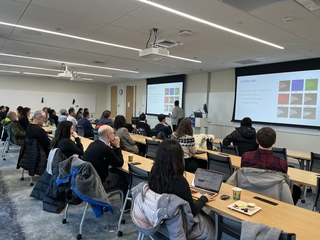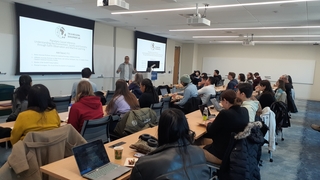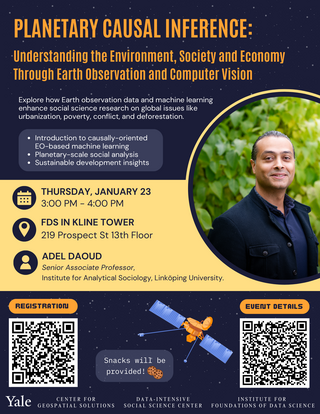Event Details:
- Date: Thursday, January 23rd
- Time: 3:00 – 4:00 p.m.
- Location: FDS, Kline Tower, 13th Floor, Room 1327A
- Refreshments: Coffee, tea, and cookies will be provided at 4:00 pm in Room 1307
If you are able to join us, please RSVP by next Tuesday 21st.
Streaming to Yale community only via Webcast.
Planetary Causal Inference explores how social science can benefit from Earth observation (EO) data to advance understanding of humans as a species and their impact on their environment, society, and economy. Traditional methods relying on tabular data, like surveys and national statistics, are costly and sometimes limited in scope, hindering planetary-scale analysis. EO data gathered via satellites offer a complementary approach that captures global, real-time information, enabling researchers to study phenomena like urbanization, poverty, conflict, and deforestation at fine spatial and temporal resolutions. We introduce the emerging field of causally-oriented EO-based machine learning (ML), where spatial data derived from images are analyzed using advanced ML models to create proxies for social science metrics and for use in causal inference pipelines. We discuss how these planetary causal inference methods can produce high-resolution insights about global social issues, providing new ways to assess conflict, sustainable development, and a range of other phenomena. By combining insights from geography, history, and multi-scale analysis, Planetary Causal Inference lays a foundation for researchers to address broad, integrated questions across household, neighborhood, regional, and global scales with a principled approach to inference.
Adel Daoud is a Senior Associate Professor at the Institute for Analytical Sociology, Linköping University, and an Affiliated Associate Professor in Data Science and Artificial Intelligence for the Social Sciences, Department of Computer Science and Engineering, Chalmers University of Technology, Gothenburg, Sweden. Previously he held positions at Harvard University, Stanford University, the University of Cambridge, the Max Planck Institute for the Studies of Societies, and the Alan Turing Institute. His research has both a social scientific and methodological orientation. For the social sciences, he researches global development, focusing on global poverty and health. Daoud implements novel methodologies in machine learning and causal inference. He has published in journals such as PNAS, Science Advances, World Development, International J of Epidemiology, and Ecological Economics, and machine-learning conferences such as the Association for the Advancement of Artificial Intelligence (AAAI) and the North American Chapter of the Association for Computational Linguistics (NAACL). (More information is provided at www.adeldaoud.se)
Daoud leads The AI and Global Development Lab (more information at global-lab.ai). The vision of the Lab is to “combine AI, earth observation, and socio-economic theories to analyze sustainable and human development globally.” The Lab’s activities are a collaborative effort at Harvard, Texas, Chalmers, and Linköping University. The Lab is mainly funded by the Swedish Research Council.
Daoud is also the creator of a new podcast called the Journeys of Scholars. The Journeys of Scholars is a podcast with conversations about the trajectories, macro-micro strategies, habits, and advice of top-class academic performers. The conversation is about topics that are usually not discussed as systematically in public academic settings as they should be. While there is no one blueprint for academic success, these sessions are intended to provide advice and guidance for scholars striving toward excellence by observing how different top performers achieved their goals. After all, we all need the advice, assistance, and inspiration from our forerunners who paved the way for us toward new frontiers. This podcast aims to supply these pieces of advice, assistance, and inspiration.
You can find all the recent interviews on Spotify, and on the Youtube playlist. Some of the recent scholars that appear on the show are the following: Professor Gary King at the Institute for Quantitative Social Science, Harvard University (Link to the show); Professor Xiao-Li Meng at Dept of Statistics, Harvard University (Link to the show); Prof. Stephen Raudenbush at Department of Sociology, University of Chicago. (Link to the show); Professor Christopher Winship at the Department of Sociology, Harvard University (Link to the show); Prof. Jennifer Hill at PRIISM, New York University. (Link to the show).
Co-hosted by the Yale Center for Geospatial Solutions, the Yale Institute for Foundations of Data Science, and the Data-Intensive Social Science Center.
